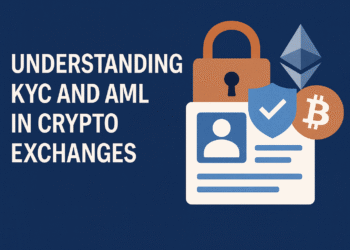What Is a Crypto ETF?
A cryptocurrency exchange-traded fund (crypto ETF) is a financial product that tracks the performance of a specific cryptocurrency or a basket of digital assets, and is traded on traditional stock exchanges, just like shares of stock or other ETFs. At its core, a crypto ETF allows investors to gain exposure to the price movements of cryptocurrencies—such as Bitcoin or Ethereum—without having to buy, store, or manage digital coins themselves.
There are two main types of crypto ETFs:
- Spot Crypto ETFs: These funds directly hold the underlying cryptocurrency (e.g., physical Bitcoin or Ethereum). The ETF’s share price tracks the real-time market price of the crypto asset.
- Futures-based Crypto ETFs: These funds do not hold the cryptocurrency itself. Instead, they invest in futures contracts tied to the price of the asset. This means the ETF’s performance may diverge from the spot price, especially over time, due to factors like contract roll costs.
The approval of spot Bitcoin ETFs, particularly by the U.S. Securities and Exchange Commission (SEC), has been a major milestone, opening the door for more regulated and accessible crypto investment products.
How Do Crypto ETFs Work?
Crypto ETFs function similarly to traditional ETFs. When you buy shares of a crypto ETF on a stock exchange, you are purchasing a stake in a fund that either owns the cryptocurrency itself (spot ETF) or holds derivatives such as futures contracts (futures ETF). The ETF provider is responsible for managing the underlying assets, which includes custody (secure storage), regulatory compliance, and tracking the asset’s price.
Key structural features:
- Custody: For spot ETFs, the fund manager relies on reputable custodians with robust security protocols to hold the digital assets. This reduces the risks and technical hurdles of self-custody for individual investors.
- Pricing: The ETF aims to closely track the price of the underlying asset or index. For spot ETFs, this is straightforward. For futures-based ETFs, tracking errors may arise due to market dynamics in the futures market.
- Regulation: Crypto ETFs are subject to oversight by government regulators (such as the SEC in the U.S.), which mandates rules for transparency, reporting, and investor protection. This regulatory framework is a key draw for many traditional investors.
- Trading: Investors can buy or sell ETF shares through brokerage accounts, just like stocks. This makes crypto exposure accessible without needing to set up digital wallets or navigate crypto exchanges.
Benefits of Crypto ETFs
Crypto ETFs offer several advantages for both new and seasoned investors seeking exposure to digital assets:
- Diversification: Some crypto ETFs track a single asset (like Bitcoin or Ethereum), while others are structured as index funds holding multiple cryptocurrencies. This allows investors to diversify their holdings efficiently.
- Ease of Access: ETFs are bought and sold through regular brokerage accounts, so investors don’t need to set up crypto wallets, manage private keys, or deal with unregulated crypto exchanges.
- Regulation and Safety: Trading regulated ETFs provides a layer of security and oversight. Investors benefit from the protections and standards enforced by financial authorities.
- Liquidity: ETFs typically offer high liquidity, allowing investors to enter or exit positions quickly during market hours.
- Institutional Adoption: The launch of crypto ETFs, especially spot ETFs, has encouraged greater institutional participation, bringing more legitimacy and stability to the crypto market.
Risks and Limitations
Despite the advantages, crypto ETFs are not risk-free. Investors should consider the following factors:
- Volatility: Cryptocurrencies remain highly volatile, and ETF share prices will reflect the underlying market’s swings.
- Regulatory Uncertainty: Changes in government policy or regulatory crackdowns could impact the availability or operation of crypto ETFs.
- Management Fees: Most ETFs charge annual management fees, which can erode returns over time. These fees may be higher for crypto ETFs due to custody and compliance costs.
- Tracking Error: Especially in futures-based ETFs, the performance may diverge from the spot price due to the mechanics of rolling futures contracts and market liquidity.
- Limited Crypto Exposure: Not all cryptocurrencies are available in ETF format. Most products focus on major assets like Bitcoin and Ethereum.
Popular Crypto ETFs in 2025
The crypto ETF market has expanded rapidly, with several high-profile launches and rising investor interest. As of 2025, some of the most notable products include:
- Spot Bitcoin ETFs:
- BlackRock iShares Bitcoin Trust (IBIT): One of the highest-volume spot Bitcoin ETFs, backed by BlackRock’s reputation and robust custody solutions.
- Fidelity Wise Origin Bitcoin Fund (FBTC): Another leading spot Bitcoin ETF, popular for its competitive fees and trusted brand.
- Ethereum ETFs:
- VanEck Ethereum ETF (ETHV): Tracks the price of Ethereum, offering direct exposure through a regulated product.
- Grayscale Ethereum Trust (ETHE): Although originally a trust, it has made moves toward ETF conversion, increasing liquidity and transparency.
- Crypto Index Funds:
- Bitwise 10 Crypto Index Fund (BITW): Offers diversified exposure to the top 10 cryptocurrencies by market cap.
Inflow Trends:
Spot Bitcoin ETFs in the U.S. saw record-breaking inflows after SEC approvals in 2024, with billions of dollars pouring in from both retail and institutional investors. Ethereum ETFs and index funds have also seen rising interest, reflecting a broader appetite for diversified crypto investment products.
The Future of Crypto ETFs
The evolution of crypto ETFs is likely to accelerate in the coming years. Key trends and possibilities include:
- Global Expansion: As regulators in Europe, Asia, and other regions approve their own spot and futures-based crypto ETFs, global access to these products is set to increase.
- Inclusion of Altcoins: Future ETFs may include a broader selection of digital assets beyond Bitcoin and Ethereum, such as Solana, Polygon, or other emerging cryptocurrencies.
- Tokenized Funds: Some firms are exploring blockchain-based ETFs, where fund shares themselves are tokenized, further bridging traditional finance and decentralized assets.
- Innovation in Indexing: Expect to see more sophisticated crypto index funds, smart beta strategies, and thematic ETFs tailored to specific sectors (like DeFi or Web3).
Crypto ETFs are poised to play a transformative role in making digital assets more accessible, regulated, and integrated into the broader financial system.
Frequently Asked Questions (FAQ)
What is a crypto ETF and how does it differ from buying crypto directly?
A crypto ETF is an exchange-traded fund that tracks the price of one or more cryptocurrencies, letting you invest via a brokerage account. Unlike buying crypto directly, you don’t own the underlying coins; instead, you hold shares in a regulated fund that manages crypto custody, compliance, and reporting for you.
Are crypto ETFs regulated?
Yes, crypto ETFs (especially those in major markets like the U.S.) are regulated by financial authorities such as the SEC. This means they must comply with strict rules on transparency, asset custody, and investor protection.
What are the most popular crypto ETFs right now?
The most popular crypto ETFs in 2025 include spot Bitcoin ETFs like BlackRock IBIT and Fidelity FBTC, as well as Ethereum ETFs such as VanEck ETHV. Diversified index funds like Bitwise BITW are also widely traded.
Is a Bitcoin ETF a good investment for beginners?
A Bitcoin ETF can be a suitable entry point for beginners who want regulated, easy exposure to Bitcoin without the technical hurdles of wallets and exchanges. However, investors should be aware of crypto’s volatility and only invest amounts they’re comfortable with.


















